 My two eldest daughters are taking responsibility for the raising and training of our puppy. Most of the time they love it. He’s sweet and cuddly and fun to be with. But he is also a puppy. Which means that he chews everything and seems to interact with the world with his teeth, or by jumping on people. Po was the top of his puppy class which was a great source of pride for my daughters. He’s a Goldendoodle, so he’s pretty smart. He catches on quickly and wants to please. Sometimes. They graduated to Beginner Obedience and Po is now in the “teenage” years. One night after dog training they came home looking very dejected. “Po was awful,” they said. “It was so embarrassing.” My mind instantly jumped to images of our dog snarling and attacking other dogs. Did he bite someone? Are we going to get sued? Oh, no. “He wasn’t paying attention in class.” I start to laugh, take one look at their sad faces, try to get serious, and then just lose it. Yes, I realize that having your dog jumping everywhere in class and not listening or following directions is very annoying, but it is also so comically ironic! “Welcome to my world!” I chortle. They don’t get it. I take the opportunity to sit down with them and teach them an important parenting life lesson: Your self-worth as a parent does not come from your children’s behavior. Let me say that again. Your self-worth as a parent does not come from your children’s behavior. I didn’t know this with my first child, or even my second or third. My first three kids were pretty compliant and obedient children. They didn’t bite people, or throw toys, or get kicked out of church nursery. I thought it was all me. I would look at other parents, the ones whose children were melting down in the grocery checkout line and just shake my head. Oh, that poor mother. If only she was a better parent and more consistent with her discipline. Ha! Then along came my fourth. My sweet, snuggly, loving little boy who can drive anyone up the wall in two minutes. I’d done all the same things with him, but I was getting different results. I even went through a period of time during his terrible twos where I wondered if I could ever really love this kid. I’d pick him up from nursery inwardly cringing and waiting to hear what horrible thing he’d done that week. I was embarrassed. I felt like people were judging me and thinking I was a bad mom. And that’s when it hit me. Children are people too. They are individuals. They are unique. And they are responsible for their own actions. My responsibility as a parent is to train them, correct them, and point them to Jesus. My responsibility is NOT to make them perfect. Letting go of that was such a relief. Sure my kid might be screaming in the checkout aisle, but that’s no reason for me to be embarrassed! I’m going to correct him, tell him to stop, give him consequences for his actions, remove him as quickly from the situation as possible, but I’m not going to feel like a failure as a parent. I’m doing my job. He’s the one who is choosing how to respond. And that’s what I tried to tell my girls. Their job is to remain calm and assertive and correct their puppy. But Po is a puppy and he’s going to act like a puppy. He’s going to be distracted, and disobey, and try to see exactly where that boundary is. That doesn’t mean that they are bad puppy parents, it just means that they have a puppy. And they need to stay calm and not allow their self-worth to be tied up with how their “child” is behaving. I can’t make my kids be anything. I can only be faithful to do what God has called me to do. My self-worth comes from Him alone, not from any behavior—good or bad—that my children exhibit. (ps. You know our family likes making music videos. Here is one that my girls made about Po. We really love him!)
8 Comments
I had a rough morning.
We’re having some family issues going on and I’m stressed. I’m not sleeping well and I’m waking up at 5:30 in the morning, unable to go back to sleep. And, for those of you who are early risers by choice, I do not typically wake up at 5:30. That’s the middle of the night. People should be asleep at 5:30. My youngest caught a bad cold a month ago and needed to go back on oxygen. We’re slowly weaning him off, but he needs it for now. Anyone who has never had the joy of lugging around an O2 tank, or using a concentrator, might not know that oxygen is measured in “liters per minute,” LPM. My son typically needs from .5 to 1 lmps to stay saturated. Not this morning though. This morning I wake him up and he’s at 99% oxygen saturation which is great. I go to change his diaper, heat his food, and start to feed him, and I notice that he’s desatting, dropping down to 94%. Not good. So I turn up his concentrator from 1lpm to 2lpm. He’s still hovering and begins to drop lower. When he hits 89% and the alarm starts to go off, I’ve bumped him up to 3lpms, which is very high flow. I reposition him, he bumps back up to 94% before starting to slowly drop. I pull out the suction machine, squirt salt water up his nose and suction him. He briefly goes up to 95% but is soon back down at 90%. I’m literally freaking out. I’m going to have to call 911. He’s going to wind up in the hospital. And then I look, really look, at the oxygen concentrator. The tube had become disconnected. He’s been on room air for the last hour. No amount of repositioning, or suctioning, or getting him to cough was going to help. He needed to be connected to the source. The same is true for all of us. There are so many good things that we need to be doing. Going to church. Being part of Christian fellowship. Spending time with our kids. Mentoring others. But if we’re not connected to the Source, then everything else is going to be in our own power and we all know how that ends. Why is this so hard? I don’t know about ya’ll, but the first thing I drop when I’m short on time is my quiet time. Someone, I think it was Martin Luther, said something like this, “I’m too busy to not have a three hour quiet time.” Of course, he said it (if it was him) in German, and he probably said it better, but you get the point. Without being connected to the Source, we’re going to fail. And if we want to make it through the day, we’d better take time to check our connection. 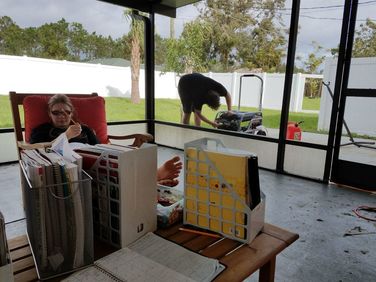 It’s been a tough month in the Evans’ household. The baby, Benjamin, has started a new type of seizure activity that is proving very hard to control. He also caught a horrible head cold that has severely impacted his breathing and increased his oxygen needs. I fell and bruised my ribs bad enough that the doctor said I might as well have fractured them. And, oh yeah, a little thing called Hurricane Irma came through and shut off our power for 5 days. Lots of stuff to complain about and feel sorry for myself about. Quite a bit of despair and wondering if life is really worth it. Much time spent peering into a gloomy crystal ball that predicts a bleak and miserable future. A few pity parties and tears and “woe is me” phone calls to my sister (who is dealing with her own personal crisis with much more maturity and faith than I am). But God. I heard a pastor preach a whole sermon on those two words once and how awesome they are. If you think about it, those are the best two words in the world. When Irma knocked out our electricity we were ready with the huge generator (only one left to purchase in the entire city) we’d snatched up right before Matthew last year. Since we never lost power, it was still brand new, but we kept it because Baby Benji is on constant oxygen and, when he’s sick and on high flow, he runs through more tanks than we can stock. He needs an electric concentrator to survive for longer than a few hours. Bonus to the generator, we also got to plug in our 2 fridges and 1 deep freeze, not to mention the vitally important homeschooling essential, the pencil sharpener. We thought we were golden and, really, we were. Family in town had their power restored fairly quickly and we lived like nomads, coming home to do school during the day with flashlights (shutters are still up) and fans and cold showers, and sleeping at night at various air conditioned places around town. (Let me tell you, 1 pillow, 1 blanket, and 1 sleeping mat/air mattress for 9 people is a TON of bedding!) By day 3 things were getting a little old and I sent Benji and my husband to stay permanently at the in-laws so that the heat during the day wouldn’t be affecting Benji’s breathing. Also, so that I could get through 5 minutes of school without having to take care of a baby who was desatting (that’s medical jargon for “not getting enough oxygen and setting off his pulse oximeter alarms”). Why were we doing school? Well, we’d taken the week before off, and I was sure the power was going to come back on at any moment, and I only like to take an entire week off at a time instead of just a day because it throws off my planner and things like math tests and spelling tests get moved to different days. Yes, I realize how silly that sounds as I type this, but the struggle is real. I number each day of school and I couldn’t face having a 5 day week plan that didn’t end on a multiple of 5. (Think about it). So, cue the crescendo-ing self-pity and then God steps in. Our life group at church has been going through a series by Paul Tripp on Jonah. I highly recommend it! I never before realized how applicable Jonah is to my life. This last week we were finishing the series and the lesson was on how God appointed a storm, a plant, and a worm. All of them were completely under His control. Ironic, right? The question was asked, “How sovereign do you really believe God to be?” And he said something that really struck my heart. I’ll paraphrase: Often our despair is a result of not getting our own way. Ouch. I realized that I place an almost idolatrous (and maybe I should delete the “almost”) value on having my ideal of a perfect family. And when that is taken away from me, when we’re all screaming at each other, and the baby is turning two and still hasn’t developed past age 2 months, and he can’t breathe, and it’s hot, and I haven’t had coffee for 3 days, I get really depressed. And it’s not that those things aren’t worthy of being upset about, it’s that the reason I’m feeling despair is because I believe these things are outside of God’s control. I’m not getting my own way so I’m going to throw a little (or big) pity party temper tantrum. So, instead of lying on the ground and kicking my feet (which I can’t do right now with my bruised ribs anyway!) I have another choice. I can trust that God is in control of every little detail, from the worms that crawl in the dirt, to the big storms that sometimes take aim at our state and turn everyone here into rabid water bottle hoarders and abysmal drivers. Instead of focusing on the sweat dripping down my face, I can be grateful that my home is still standing with zero damage. Instead of worrying about my baby’s lack of development, I can continue to work his therapy and trust that God has got this. It’s not going to look the way I want it to look. I’m not going to get my own way in this. And that is a very, very good thing. Paul Tripp also made a comment about how God used a giant storm to reach the heart of one man. I’m not saying that Hurricane Irma was sent solely to teach me a lesson, and yes, I realize that I am typing this as I sit in my newly air conditioned home while the overhead light is shining bright and my baby’s breathing is starting to improve, but I hope that I can hold on to this new feeling of gratitude for the many, many blessings that are in my life and trust God for the rest. I’ve always maintained that the best way for a child to learn to spell is to read, read, read. The more you read, the more words you are introduced to, the more words you see repeatedly, and the better a speller you will become.
That’s great. Really, it is. And I still believe that. But what do you do in the meantime? Reading, reading, reading, is not something that happens overnight. Becoming introduced to words multiple, hundreds, thousands, of times does not happen in a day. It takes time. And while you are encouraging your child to read, they are still taking spelling tests…and possibly failing. Once again I come up against the fact that each one of my children is different. The two oldest girls are perfect spellers. And I say “perfect” because they regularly score 100% on their end of the year, Iowa State tests. (In Spelling. Let’s not talk about Math) How did I achieve such fabulous success? Not through any great spelling drills or techniques. No. They just love to read and their spelling improved by itself without any assistance from me. (However I will still happily take credit for it.) Child number 3 was a little harder. It took him longer to discover how much he loves reading, but in the year that his love grew, he went from a kid who couldn’t spell “the” to being able to take 25 new spelling words a week and get at least 23 of them correct on the Friday test. My method here was simple. Take the 25 words and write them out on a sheet of paper each day. Repetition. So, it’s not the best method, but it really worked for him. Plus, it’s what his sisters had been doing and look at what great spellers they are! (Let’s ignore the fact that if they were to take a test on Monday over the new words they would probably score the same grade as on Friday after 4 days of rewriting them.) Yay! I think. Evans children are just genetically good spellers. Let’s not mess with the technique. It’s worked (relatively pain free for me) for three children. Along comes child number 4. He’s two grades behind his brother and therefore has not quite hit that point where he loves to read. He also cannot spell to save his life. Forget words like “the.” He can’t spell “cat.” He also has a slight speech impediment so he consistently mixes up “th” and “sh” because they sound the same to him. Also “f” and “v.” No fear! Our trusty method of write out the 25 words will have him spelling like his siblings in no time! Or not. What actually happens is that he misspells 24 of the 25 words. I pull out a new technique and have him say the word out loud, spell the word out loud as he writes it, and then say the word again. That week he only misspells 23 of the words on the test. He’s also taking almost 45 minutes to do his spelling each day. Back to the drawing board, which is a euphemism for “call Mom.” She gives me a copy of Teach Any Child to Spell. It comes with a workbook. Great! I think. I’ll follow the daily lesson plans and spelling lists and he’ll be spelling like a champ in no time. Except there are no daily lesson plans. There are no spelling lists. There’s a lot of information on spelling rules and how to incorporate spelling into every day writing and the workbook has blank spaces for creating your own lists of words that follow different spelling rules. It’s not a cookie-cutter program like some homeschooling curriculum (I won’t say who I’m thinking of right now with their mountains of busy work and neatly segmented daily lessons…), it’s holistic. I hate it. I want results fast. I want the book called Teach Your Child to Spell Perfectly in Ten Minutes a Year. (I bet that book would be a best seller!) Given that my mother is usually right (I live for the day when my own children learn this about me as well!) I give it a try. Instead of a long list of random spelling words. I sit down with my son and his younger sister (one grade level behind him, but probably the same grade level for reading) and we pick a spelling rule. Then we create our own list of words using that rule. Then I dictate sentences to them using the words that we picked. There’s no fancy list to take a test from. No feeling of accomplishment when I grade a 100% for spelling words like “superfluous” correctly (Honestly, why does a 3rd grader need to know how to spell “superfluous?”). But there are also no tears. No child wailing that they’re stupid and can’t do anything right. No mom pulling out her hair and assigning said child to rewrite ten times the words they just spent the whole week rewriting. Will it work? Will I have another batch of great spellers on my hands? I don’t know. Because it’s going to take time. Lots, and lots of time. But that’s kind of the whole point of teaching, isn’t it? Summer is here and we are out of school. I find myself repeating the phrase that my mother would always say, “Find something to do or I will find something for you to do.” We were off for a total of two days before I started thinking about starting school again. Living in Florida, I have the same thought every year. Why do we take the summer off instead of the winter? It’s a million degrees outside. We don’t have a pool. No one wants to go outside and play. Which means that 8 little people are bouncing off the walls inside.
The temptation is to let the TV be their babysitter. My kids will happily sit in front of a screen until their brains turn to mush and drip out of their ears. I could have peace and quiet, but at what cost? So, when I found myself letting us eat more meals in front of the TV instead of at the table, I decided to make a change. I instigated “Family Fun Night.” I had each child come up with an idea of something they thought would be a fun evening activity. We put those ideas on little pieces of paper into a hat and each week had the toddler (since he can’t read and thus can’t cheat) pick a slip of paper. We’ve had a puzzle game night, a water balloon fight, a backyard play night, and gone out for ice cream. I’d like to say that these nights have been totally and completely fun. That’s what we envision as parents, right? All our children happily playing and loving together. The memories they will build as they cement their friendships and journey peacefully through life together. I’d really like to say that’s what has happened. Puzzle game night was first. It had been my suggestion and there was great moaning and complaining when it was the first slip of paper picked. I pulled out a huge, floor puzzle of the United States and we all sat on the floor and put it together. There was fussing and accusing people of being in the way, and one child hid a puzzle piece and let everyone spend five minutes looking for it before he produced it from his pocket. Water balloon night went a little better. I’d bought some of those new water balloons on Wish.com. The kind that attach to the hose and you fill up thirty balloons at one time. They worked great and I quickly had a large tub filled with water balloons. I had them start with water balloon duels and then played water balloon toss in order to slow down the enjoyment. Seven children can throw 120 water balloons in under two minutes. The balloon toss turned into an all out war and we were all soaked and laughing and muddy. All except child #5 who was sitting on the porch and crying because someone had thrown a balloon at her face and her clothes were wet. Backyard play was also met with derision, but running around after dinner was not usually something we have time for and everyone was having a good time. At least, until I went to heat up the baby’s food for dinner and the four year old jumped up on the counter and grabbed the boiling cup of water I’d just pulled out of the microwave. Backyard fun night turned into trip to the Walk-in Clinic night. Going out for ice cream was met with loud cheers of excitement. This was the one they’d been waiting for! It was the hardest one, in my opinion, because it meant leaving the house with 8 kids, but it was in the hat and had been chosen fair and square. I loaded everyone up, called my brother and sister to come with us for crowd control and we arrived at a local ice cream shop that had outside seating. We even took the puppy. It was like herding cats. They wandered everywhere, weren’t listening, fell off the curb and skinned their knees, dropped half their cone into the dirt, and one cried for twenty minutes because she hadn’t gotten to give her uncle a “high five” when we’d dropped him off. Then I still had to give baths and brush teeth and hustle tired, over sugared children into bed. I was exhausted and beginning to wonder whether “fun” should be part of the “Family Fun Night” title. That’s when my 7 year old (the child who had complained that “movie night” would be more fun than doing “boring stuff”) gave me a big hug and said, “Mom, that was the best night ever. I love Family Fun Night!” Ok. I’m hoping that in ten years the tears and fighting and yelling will be forgotten and all we will remember is the fun. As parents, we tell our children the same things over and over and over again. “Be nice to your brother.” “Don’t flood the bathroom.” “Quit riding your bike down the stairs.” “Don’t draw on your sister with permanent marker.” You know, the usual. We tell them these things repeatedly in the hopes that one day they will listen. So far, I’m still waiting. At least, with my little ones. But this week I had my eldest daughter give me the same lecture that I had given her just a few days previous. I wish I could say it was nice, but at least it proved she’d been listening.
It all started when she had to write a research paper for her language class. Currently, she is taking a video class, which means that I have not been very involved in her school (a situation which will need to change next year. It helped us survive this year, but I’m not too happy with it.). She picked a topic all by herself. I did at least help her get books from the library, but I didn’t supervise the writing of the paper in any way. Which meant that her topic was WAY too broad. For some reason she understood her teacher to say that she needed to write her outline before she finished reading her books, and she didn’t write her topic sentence until AFTER her outline. So, yeah. Basically the worst possible way to try to write a research paper, and her paper was pretty awful. And yes, I told her that as I graded it. She was understandably upset (she’s a little bit of a perfectionist, I don’t know where she gets that from) but I also told her that it was partly my fault for not guiding her. And more importantly, I told her that doing things wrong is how we learn to do things right. If we do something right the first time without understanding why it is right, we don’t really learn anything. But if we make a mistake and fail, then we learn from our mistakes and know how to try better the next time. I also sang her a few lines from Disney’s Frozen, just to drive the point home. Such insightful words I am able to dispense! Tiny pearls of knowledge just dripping from my lips! Sometimes I feel like an ancient guru sitting on top of my mountain, blessing supplicants with my incredible wisdom. Too bad I rarely listen to my own advice. It was ironically fitting that a few days later I was on the receiving end of that same lecture. Our puppy, Po, is (or should I say “was”?) an almost completely round ball of wooly fluff. He’s adorable. He was also getting hard to comb and the fur around his legs was starting to get matted. In all my wisdom and perspicacity, I decided that paying $50 to take him to the groomers was poor stewardship. Why pay that kind of money when you could buy a set of dog clippers for $70 and do it yourself? Now, we all know that math is not my strong suit, but even I could calculate the savings! Plus, if I hated clipping him, I only had to try it twice before the clippers paid themselves off and I would be no more out of pocket than if I had taken him to the groomers. I watched dog grooming videos online. I read dog grooming articles. I looked at pictures of how to properly clip a dog. Looking back, I can see where I went wrong. I was researching dog grooming. I should have been researching how to clip a whirling dervish. My second mistake was in choosing which length of clipper guard to use. I tried the longest one first, of course, but I didn’t really have the hang of it yet, and jumped to the assumption that it was too long. So, I went two guards shorter. After all, if a number 4 was too long, what was the point of going to a number 3? Yes, now I can see why that was stupid. Long story short, just like Po’s fur. Very short. In places. In other places it is more medium length. And in a few places it’s still long. Cute, round, fur ball now looks like he has mange. My daughters were upset. Even though they had been the ones holding him still (or rather, not holding him still while I yelled at everyone) they felt that it was my fault that he looked awful. After some tears and the growing realization that this was probably what my husband calls a “Four-week haircut” (as in, it will take that long before it grows out enough to look ok), I was feeling very, very blue. Also, regretful. In hindsight I could easily spot the three or four fallacies in my reasoning that led us to this unhappy moment. I pointed them out again and again in the hopes that somehow I could rewind time and do it all over again. Which was when my daughter told me that it was ok. She said that clipping Po’s fur well will take practice. Now that we’ve done it poorly, we know how to do it better the next time (Next time!?), and the more we try, the better we will get at it. She told me to quit obsessing over what went wrong and focus on not making the same mistakes in the future. Where did she learn such wisdom? (I’ll be honest, I liked this lecture a whole lot more when I was the one giving it, especially when she sang “Let it Go,” at me.) But, hey! Bonus points for me that my daughter was listening. And I really need those parenting points because I’m going to be mortified the first time anyone outside the family sees our dog! When I was pregnant, I would sit in the rocking chair in my new nursery and dream of what the future would be like. I envisioned her sweet face, her first toddling steps, the way her little hand would fit in mine. I imagined being the one who cuddled her at night, who kissed her skinned knees, who carried her piggyback around the house.
Yes, all those things are wonderful parts of motherhood. But now, as a more experienced parent, I know what kids are really meant for: Braving the cockroaches in the garage. Years ago, my husband wanted to “rescue” two bearded dragons (they were owned by a lady who had no idea how to care for them and wanted to get rid of them). I’m not a big herpetologist, but my husband loves all things scaly and reptilian, so I said, “sure.” (Plus, I was saving spouse points up for when I wanted to get a dog.) What I didn’t know about bearded dragons is that they eat gross things. Meal worms are not that awful. Crickets however are one of the most annoying creatures on the planet. They chirp All. Night. Long. And then, when you complain to your husband that either the crickets have to go or you will, he rips all the wings off of them so they can’t make any more noise. Yeah. Totally disturbing. I’ll admit. It was rather entertaining to watch the two dragons chase down crickets in their terrarium, but they always were full before they caught them all and then the nocturnal singing would begin. It’s like camping in your own home. Once I outlawed crickets, my lovely spouse turned to huge green worms that splatted on the sides of the cage when bit. They also cost $2 a worm. Then he discovered some breed of roaches. They have a special name. He assures me that they are not the same as the palmetto bugs that roam about Florida. I call them cockroaches. He also tells me that in order to save money, he needs to breed them. He purchases 25 roaches in the mail and creates a special environment for them in a Sterilite tub with paper egg cartons. He promises me that this special breed cannot climb, so the lid isn’t even really necessary. (I insist that it is necessary if he wants to stay married.) Flash forward a year or two, and we now have a thriving roach metropolis that has grown to TWO tubs, crawling with huge roaches. Now, since this breed of roaches truly can’t climb, it should be fine. They don’t smell. They eat the kids’ left over apple cores, and they are a free source of food for the dragons. But, as Jeff Goldblum says in Jurassic Park, life finds a way. The neighborhood roaches discover this roach utopia and prowl about the outsides of the tubs, trying to break in. The neighborhood flies discover the endless supply of apple cores and have no trouble fitting in between the cracks on the lids to feast. The neighborhood spiders discover the all-you-can-eat buffet of flies and set up shop all around the tubs. I am a patient and long suffering woman. I learn to open the door to the garage and turn on the light before stepping in. I yell loudly for “Charlie,” the ginormous roach that lives under the deep freeze, to run and hide before I walk out. We have a truce of sorts, both terrified of each other. But last night Charlie broke the truce. And he had invited his uncles, and his cousins, and his aunts to come visit. Instead of running to hide, he ran at my feet. I screamed. (It’s a well known fact that when dealing with scary, creepy-crawly things you need to yell. The sound waves batter them and force them to run away.) He finally got collected enough to run back under the deep freeze, but his relatives were not so savvy. I picked up the nearest heavy object and pummeled the closest roach before retreating to the safety of the house. Panting heavily, I still hadn’t taken the trash out. This was when I realized what I could never have imagined sitting there in my nice clean nursery awaiting the birth of my first child: This is why I have kids! “Grace!” I scream, “I need you to take the trash out!” Genius. Pure genius. Summer is here and I find myself repeating multiple times a day, "Find something to do or I will find you something to do!" So, when they come up with an idea, I am obligated to help them out. My eldest daughter loves making music videos and while shooting them can be a little tense at times, the beauty of editing means that the viewer can't know how many times it took to get a shot or how much screaming and crying went on in the background. This is our latest video, set to the song "You Might Think" covered by Weezer in Disney's Cars 2 movie. How do you keep your kids occupied through the summer? Share! 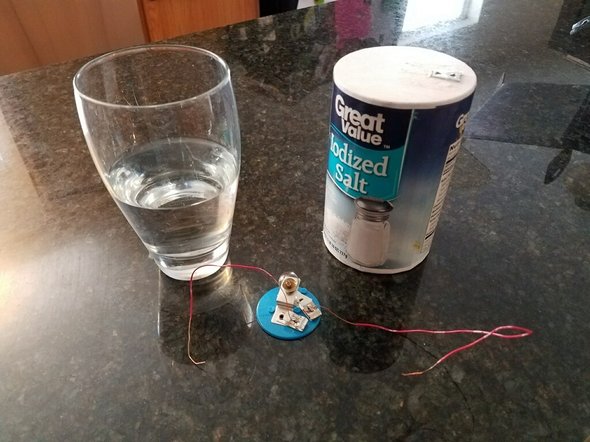 Lately we have been studying the story of Esther and a question came up. Did Esther lie? Mordecai told her to not let anyone know that she was a Jew, but did she lie about it? If someone asked her if she was a Jew did she avoid the question? Or did she just do a great job of convincing everyone that she wasn’t Jewish. Is that lying? Is deliberately leading someone to believe something that is not true, even if you don’t say anything, a lie? Well, we can’t know for sure about Esther since it doesn’t say in the Bible, but how about something more modern? I’m going to give you a completely hypothetical situation that could happen in any of our homes at any time and see what you think. Let’s pretend that you are a homeschooling mom. That shouldn’t be too hard to imagine, since if you’re reading this homeschooling blog you are most likely a homeschooler. Let’s also pretend that you are not very good at science. That could be harder for some of you. For the sake of this story let’s imagine that when you attempt to do science experiments with your kids it never turns out the way the directions say. Let’s say (now remember, this is a hypothetical situation) that almost every science experiment you have tried has failed, from trying to make a cloud in a bottle to making a colored water thermometer. Your fail rate is so high that your kids always sigh and say “Another failed experiment!” like it’s what they’ve come to expect. Now, in this totally imaginary situation, let’s pretend that you come to a great experiment on the electrical conductivity of salt water. You’re excited! This one seems pretty fool proof. Finally you can show your kids how science is supposed to work! You even have all the items you need to do the experiment. You carefully screw the light bulb into the little round device. You strip an inch of plastic off the ends of the three wires. You clip two of the wires into the bulb thingy and hook up one end to a battery and the third wire to the other end of the battery. Then, you demonstrate how touching the two free wires together makes the light bulb turn on. Success! Your kids, whose interest has been wandering as they roll their eyes and say “Another failed experiment, Mom,” (“No, it’s not!” you yell. “I’m not finished yet!”), are suddenly refocused. You use the moment to talk about how salt in the water helps conduct electricity and remind them about the electrical eels you taught about the previous day. Then, you take a cup of water and put the two tips of the wires into the water. Of course, the light bulb doesn’t light up. “Why not?” you ask your class, pleased that, for once, everything is going as planned. “It doesn’t have salt in it!” they answer, making your heart swell with pride that they were actually listening when you thought they were just poking each other and fighting about who got to sit closest to you on the couch while you were reading the science lesson. Now, it’s time to wrap up the experiment. You pour salt into the cup and reinsert the wires. The light bulb is supposed to light up, showing how salt water conducts electricity better than fresh water. Nothing happens. You pour more salt into the cup. Still no light. The kids are starting to snicker again and repeat their favorite phrase, “another failed experiment!” You are getting desperate. (Let me remind you again, this is a hypothetical situation. I’ve just got a very detailed imagination.) You pour in more salt. The water is now more solid than liquid. Still no light. You are really losing them. For the rest of their lives they are going to believe that science doesn’t work. You have to do something! Now we come back to the original question. If you lead someone to think something that isn’t true, without actually saying anything, is it still a lie? Remember, you are desperate. You really need this experiment to work. The fate of your children’s entire education is resting on this one moment in time. So, what do you do? Well, what if (still hypothetical), out of sight of your children, you touch the two ends of the wire together under the water? The light bulb turns on! “See, kids?” you cheer. “The salt water conducts the electricity better than the fresh, allowing the light bulb to turn on!” You touch the wires together under the water a few more times and they all marvel at the joy of science. Their education has been saved! So, was it actually a lie? You didn’t say anything that wasn’t true. Salt water is supposed to conduct electricity better than fresh. At least, that was what is said in your science book. Was it your fault that the experiment didn’t work? You knew how it was supposed to work, and you just helped it along a bit. Plus, you were getting tired of your kids saying, “another failed experiment.” I’ll leave the question to you. What would you have done? And please remember, hypothetical situations can also be real, so if I’ve led you to believe that this is a made-up story, well, did I really tell a lie?  Do you ever have those days when you feel like a total homeschooling noob? (In case you are not as up-to-date as me on all the latest slang, a “Noob” is a “Newbie” or someone who is new at something. At least, I think that’s what it means. And I’ve either completely dated myself right now or shown you how cool I am (do people still say “cool”?). I’m betting it’s the latter.) Days when you do something that if someone else had come to you for advice you would have told them to do the exact opposite of what you actually did? I’ve just had one of those moments. I love reading. I believe that a love of reading is vital to learning to write and spell and think. Encouraging your children to read is one of the best things you can do for their education. If a child can read and understand what they are reading, they can learn anything. (Quick product placement ad: This is why I love Learning Language Arts Through Literature. It focuses on learning to love reading and less on learning to fill in the correct word on a test.) I want my kids to love reading. I try to give them books that will capture their interest. Now, if you were to come to me and ask, “Erin, how should I get my 2nd grader son to want to read?” I would have told you the following:
“Great advice, Erin!” I’m sure you’re saying right now. None of it is earth-shattering or shocking, it's just plain commonsense (that’s another product placement pun!). So why, when it was my son, did I do the exact opposite? My 2nd grader is struggling with reading. I’d worry about it, except his older brother did the same thing in 2nd grade. 2nd grade, he couldn’t spell to save his life and reading was painful. 3rd grade, I can’t pry a book out of his hands and his spelling is a grade level ahead. (Ok, who am I kidding? I still worry. It’s what I do best.) I decided, after the New Year, that we would add in an extra reading assignment and I asked him to pick a book from the shelf that looked interesting to him. He picked The Sign of the Beaver. He thought the picture on the front of a little boy with an Indian looked interesting. He also wanted to find out what sign the beaver was going to hold. Now, if I hadn’t been such a noob, I would have realized that you can’t judge a book by its cover. No matter how cool Indians and bows and arrows are, they do not make a 5-6th grade level book easier to read for a 2nd grader. Second noob mistake. I was too rushed during the first weeks of school to actually sit with him and I assumed that he would be able to read a chapter a day by himself like his older brother. Three weeks in, I find out that he has no idea what he is reading, can’t understand one word out of five, and is basically completely lost. No problem, right? Just switch to an easier book! That was what I would have told someone else. But me? No. I jump to the conclusion that since he picked the book he should have to finish it. Thus begins another painful two weeks of sitting with him while he drags through a chapter a day, still not really understanding any of it since by the time he’s finished a sentence he’s forgotten how it started. After beating my head against the wall like this for a while, I go to my mother. She tells me exactly what I already knew but was ignoring. Switch books. Find one that is just under his reading level. Find one that interests him. So, the next week I tell him that we are going to give Sign of the Beaver a rest and I pull out a Magic Treehouse book. He loved it. He begged to read more than one chapter a day. He read it easily and laughed at the funny parts. He finished it in a week and wanted to read the next book in the series. Reading is suddenly fun. Why did I make such a noob mistake? I don’t know. I guess I got so caught up in teaching how to read that I forgot to teach him to love to read. Not my first homeschooling mistake and it definitely won’t be my last. I wish I’d asked for advice right away, but I’m glad I asked for it at all. Sometimes we get so caught up in being independent teachers that we forget the wealth of knowledge that is out there. And sometimes the advice we get is something we already know but have forgotten to do. I hope all of you either have an experienced homeschooler in your life that you can go to for help, or that you are that person for someone else! We may be alone while we’re teaching each day, but we’re not alone in this journey! |
Erin Evans
You know that family that shows up to church in the 15 passenger van? The one that homeschools? Ever wondered how they make it through the day or wished you could be a fly on the wall of their house? Well, I'm inviting you in. I'm 36 and I ride herd on 8 children (oldest is 12), 3 cats, 2 bearded dragons, and one puppy. It's loud, chaotic, and imperfect. Welcome to Life in the Big House! Archives
November 2018
Categories
|

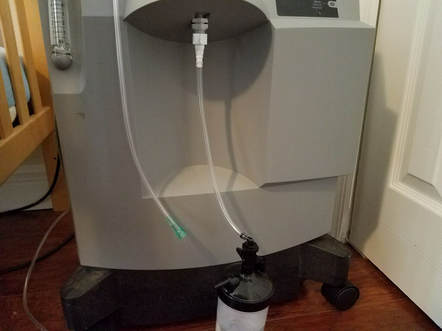
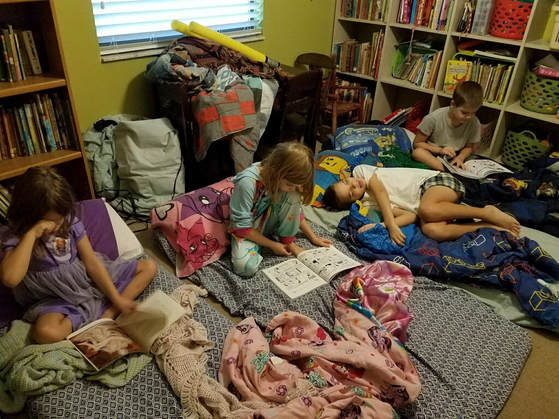
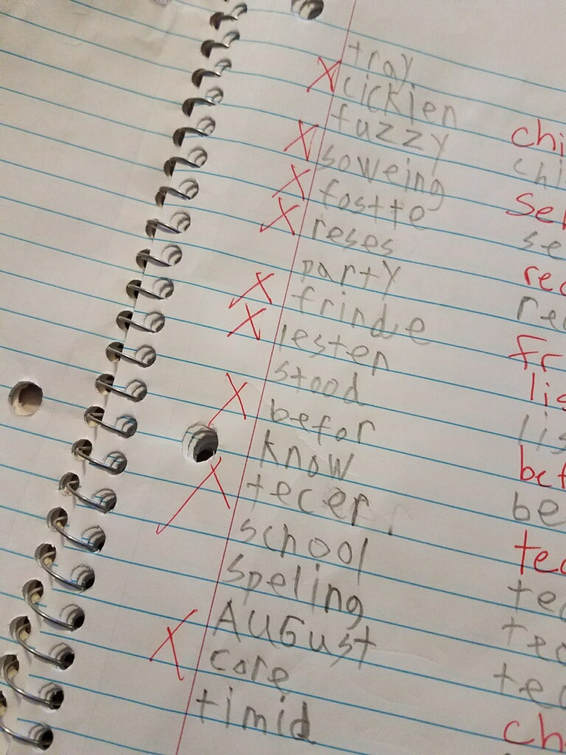
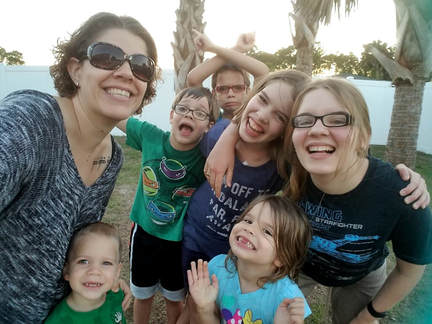


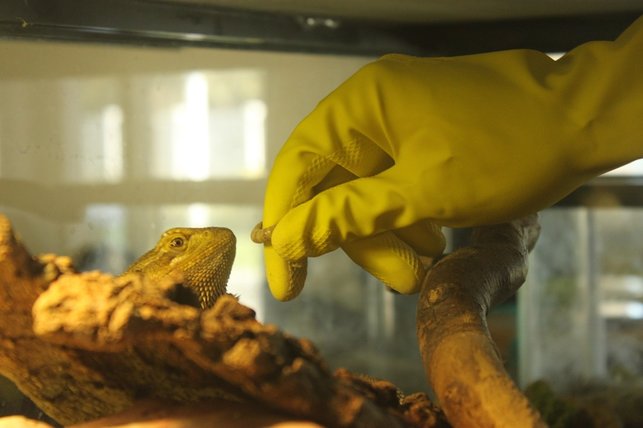

 RSS Feed
RSS Feed
